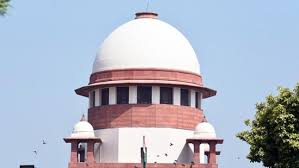Resulting in restoration of the decree passed by the Trial Court and setting aside of the first appellate decree dismissing the suit of the plaintiff – respondent (“plaintiff”, hereafter) (Para 1)
The Mysore (Personal & Miscellaneous) Inam Abolition Act, 1954 (“the Act” hereafter), enacted for abolition of Inams in the State of Mysore, came into force on 15th March, 1955. By virtue of the Act, all rights, title and interests in the land, hitherto vested in the Inamdars, ceased and came to be vested absolutely in the State of Mysore. However, the Act provided for an opportunity to the Inamdars to make an application under section 9 thereof to register as an occupant of the land. (Para 2(iii))
The High Court interpreted the Commissioner’s order to be in favour of the plaintiff’s vendor, such interpretation being bolstered solely by the revenue records exhibited by the plaintiff. Though it was noted that the grant of occupancy rights in favour of the plaintiff’s vendor under section 9A was contrary to the provisions of the Act, it was observed that the decision having attained finality could not be challenged after such extensive passage of time before a civil court. The plaintiff was, therefore, held to have established the better title, resulting in upholding of the decree passed by the Trial Court. (Para 2)
In the present case, the Commissioner’s order distinctly denying the rights of occupancy to the plaintiff’s vendor is evidence that renders these revenue entries unworthy of acceptance. (Para 16)
It is settled law that a vendor cannot transfer a title to the vendee better than he himself possesses, the principle arising from the maxim nemo dat quod non habet, i.e., “no one can confer a better title than what he himself has”. In the present case, the plaintiff’s vendor having been denied the right of title in the land by the Commissioner’s order, could not have conveyed the same to her vendee. (Para 18)
In the light of the discussions made above, we hold that the Trial Court erred in decreeing the suit by placing on a higher probative pedestal the revenue entries. In our considered opinion, the first appellate court rightly overturned the findings of the Trial Court and dismissed the suit. The Commissioner’s order was correctly interpreted to determine as to in whom occupancy rights vested in respect of the ‘B’ schedule property. (Para 27)The first appellate court having examined the facts in extenso, the High Court ought not to have interfered with the findings rendered therein by virtue of being, in second appeal, a court of law. As was astutely said by this Court in Gurdev Kaur vs. Kaki[(2007) 1 SCC 546], a second appellate court is not expected to conduct a “third trial on facts” or be “one more dice in the gamble.” The decision rendered by the first appellate court, not being in violation of the settled position of law, ought not to have been interfered with. With utmost respect to the High Court, we are constrained to observe that the question framed by it could be regarded as one of law, if it all, but did not merit the label of a substantial question of law so as to warrant interference with the first appellate decree under section 100 of the CPC. (Para 28)
That apart, the High Court was remiss in reversing the findings of facts rightly arrived at by the first appellate court. The decision to adopt the Trial Court’s approach of interpreting the Commissioner’s order within the framework of the revenue records that were exhibited was yet another aspect in which the High Court fell in error. An attempt ought to have been made by the High Court to harmoniously read the Commissioner’s order with the provisions of the Act and to interpret the same so as to render it in consonance with the law, the failure of which leads to the inescapable conclusion that the same is indefensible. (Para 29)
The impugned judgment and decree are, accordingly, set aside. The civil appeal stands allowed and the decree passed by the Trial Court, extracted hereinabove, is set aside with the result that the plaintiff’s suit shall stand dismissed. There shall be no order as to costs. (Para 31)
SUPREME COURT OF INDIA
2023 STPL(Web) 431 SC
[2023 INSC 1009]
P. Kishore Kumar Vs. Vittal K. Patkar
Civil Appeal No. 7210 of 2011-Decided on 20-11-2023
https://stpllaw.in/wp-content/uploads/2023/11/2023-STPLWeb-431-SC.pdf







